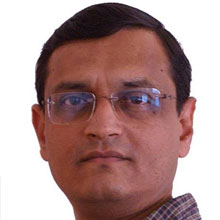

Some Thoughts on the Cnn-ibn Discussion
- /
- Articles and Blogposts /
- Some Thoughts on the Cnn-ibn Discussion
Watching Rajdeep Sardesai, Prof. Trilochan Sastry and the others debate the MP Scorecard a few minutes ago on CNN-IBN was a terrific feeling. Six years of doing this at a State level, now going National, is a great step forward for us at DAKSH. Thanks for making this happen, ADR!
The discussion on TV, though, raised some interesting issues. This post is about those issues, not about our own back-patting, so stay with me!
First, about the sample size. People on both (all?!) sides of the political divide referred to 500 samples in each Constituency as being too small. Actually, that’s bigger than the sample size suggested by statistical theory. We only needed 384 samples, to be able to figure out, with about 90% accuracy, what people are thinking. The thing was, we needed to implement the survey based on some strong methodology. We needed to stratify the respondents (which we did, on population and caste-type, based on the Indian Census); we needed to randomize the responses (which we did, beginning with random locations within each Constituency through well-accepted methods of field sampling). So, no, the sample is NOT small. It is large enough – and the methodology strong enough – to reflect what people think in each Constituency.
Second, about the issues in the survey not being the MP’s job. Well, I am yet to see an MP campaign anywhere promising that s/he will do a good job passing legislation in Delhi and not focus on the constituency itself. Like it or not, every single candidate – including the MPs on the panels – go out and promise the same things that we asked about in our Survey. And, in India, where basic needs are yet to be covered for large sections of the population, every voter wants politicians to deliver IN HIS/HER constituency, not in debates in Delhi. I am not saying the latter is not important. I am only saying that the Survey is about what people want AND what candidates promise.
Lastly, about the argument that the Survey must be flawed because, in all the BJP constituencies where the MPs scored low, MLAs won thunderingly recently and vice versa in Congress constituencies. Specifically, people on the panel were exercised that Sushma Swaraj, who in their opinion is a great parliamentarian (“She speaks so well in Parliament”, someone said), got such a low rating. The statistic used was that 7 of the 8 MLA constituencies under Sushmaji’s Vidisha constituency were won by the BJP in the recent elections. So obviously, the Survey must be flawed, right? Well, obviously, I don’t agree with that conclusion. The fact of the matter is, people vote very differently between voting an MLA and voting an MP. Even in cases where an MP election has been held simultaneously with an MP election, there has not been a strong correlation between results. So Sushmaji’s performance in her constituency, IMHO, has little to do with MLAs there winning or losing. Further, the voting pattern itself is unfortunately not related much to people’s perceptions of performance. Let me give you an example. As part of this survey, I visited a fairly remote part of Jharkhand, from where Mr. Yashwant Sinha has won thrice. He has never been to the location I went to – not in twenty years. But he won that specific booth in the last election. How is that possible, you ask? One plausible reason is because voting in large sections of the country is “managed”, as one of our field partners says. People have great expectations from their representatives in the cold light of day, but are disillusioned enough to deliver a “managed” vote (read: paid for in some manner) because they think it won’t make any difference anyway. This is not to say that Sushmaji – or any of the other MPs – has not done good work in her constituency. This really is about the perceptions of her constituents about ground realities.
This has to change. Discussions in the political sphere, especially running up to the elections, should be about the issues that people face, not about the individuals that are contesting. That’s the intent of the Survey: to bring to the fore the issues that candidates should debate, so that the winner can focus on them in the future. Once these issues are solved, people WILL consider voting for good parliamentarians, worrying about Indian aid to China 🙂 rather than local sewage. We all look forward to that day!
The views expressed in this article are solely those of the author’s and they do not represent the views of DAKSH.

Kishore Mandyam
RECENT ARTICLES


Civil Disputes, Criminal Justice Resolutions

Set the guardrails for AI use in courtrooms

Why ICAI’s audit limit is misguided and outdated

-
Rule of Law ProjectRule of Law Project
-
Access to Justice SurveyAccess to Justice Survey
-
BlogBlog
-
Contact UsContact Us
-
Statistics and ReportsStatistics and Reports
© 2021 DAKSH India. All rights reserved
Powered by Oy Media Solutions
Designed by GGWP Design